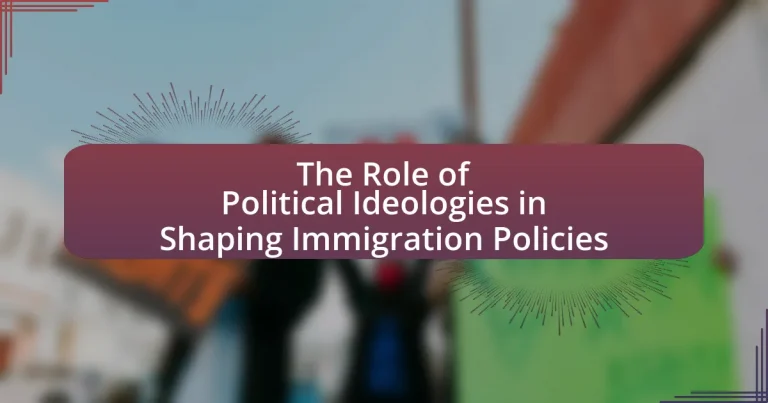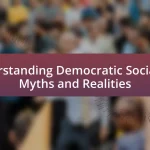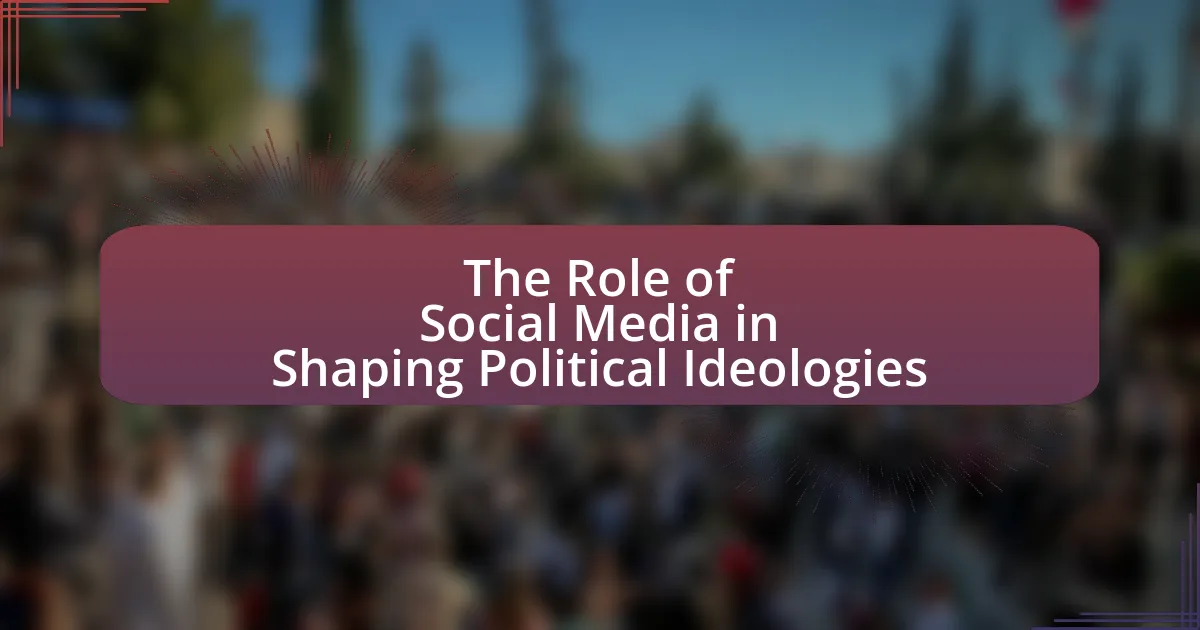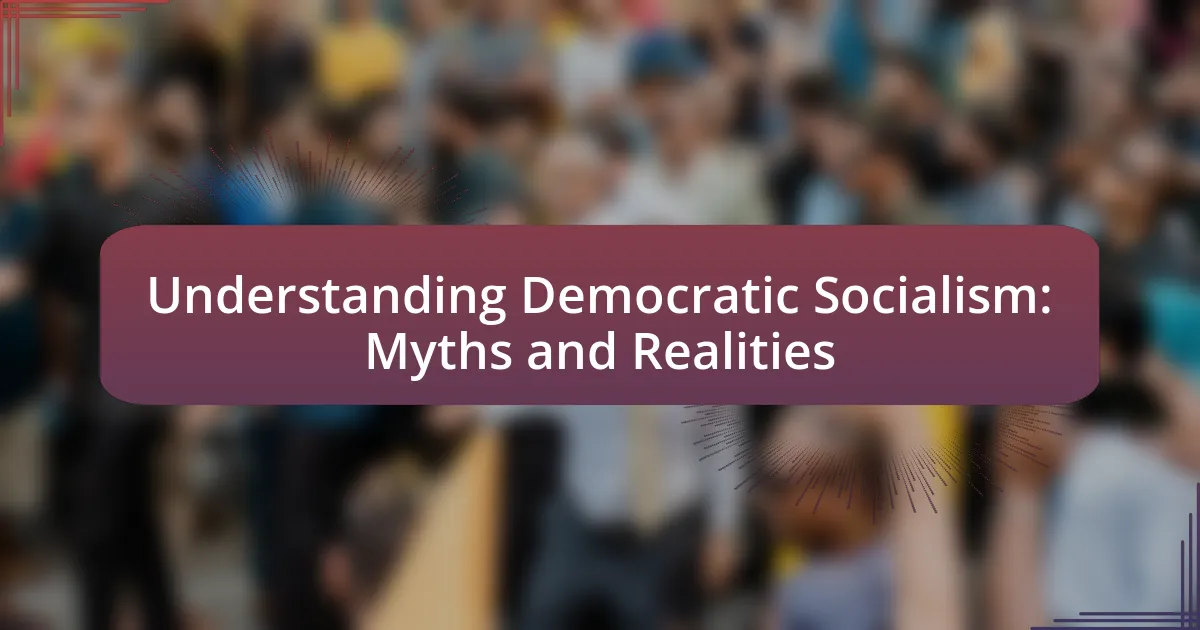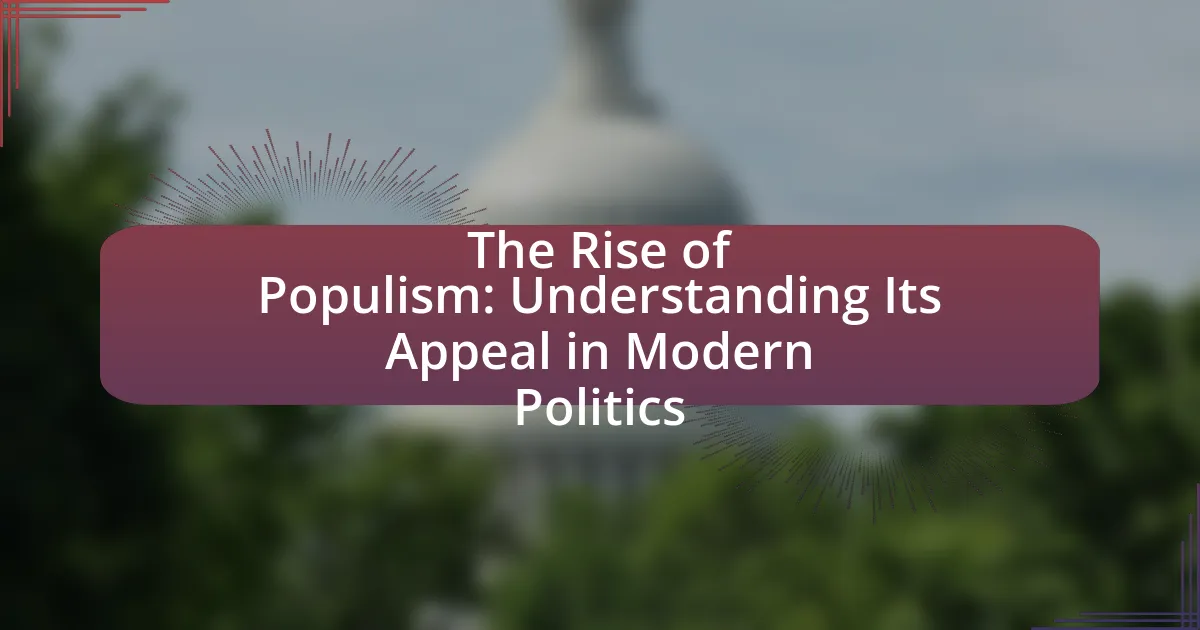The article examines the significant role of political ideologies in shaping immigration policies, highlighting how conservative and liberal beliefs influence legislative decisions. It discusses key ideologies such as liberalism, conservatism, nationalism, and socialism, and their impact on immigration policy outcomes, including border control, refugee and asylum policies, and immigrant rights. Historical examples illustrate the contrasting approaches of different administrations, showcasing how ideological frameworks affect public opinion, social services access, and the integration of immigrants. The article also addresses the challenges posed by conflicting ideologies and suggests strategies for developing inclusive immigration policies.
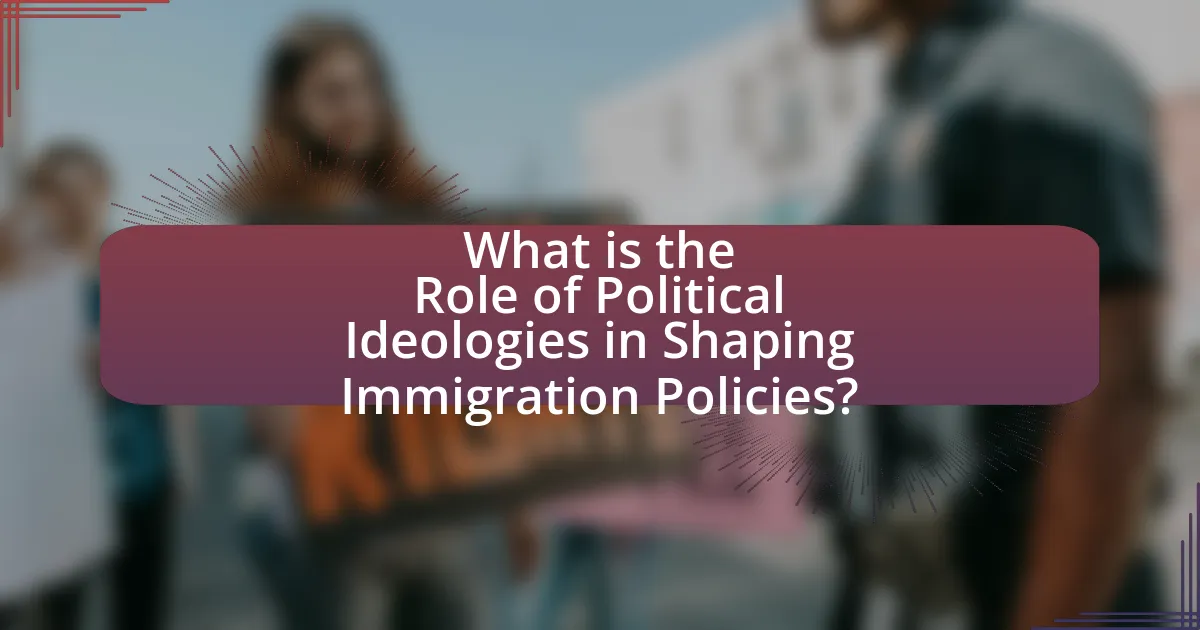
What is the Role of Political Ideologies in Shaping Immigration Policies?
Political ideologies play a crucial role in shaping immigration policies by influencing the values and priorities that guide legislative decisions. For instance, conservative ideologies often emphasize national security and economic protectionism, leading to stricter immigration controls and policies aimed at limiting the influx of immigrants. In contrast, liberal ideologies typically advocate for more inclusive immigration policies that prioritize humanitarian concerns and the benefits of diversity, resulting in more open borders and pathways to citizenship. Historical examples include the Immigration and Nationality Act of 1965, which reflected liberal values by abolishing racial quotas, and the Secure Fence Act of 2006, which aligned with conservative priorities by enhancing border security. These ideological frameworks directly impact the formulation and implementation of immigration laws, demonstrating the significant influence of political beliefs on immigration policy outcomes.
How do different political ideologies influence immigration policy decisions?
Different political ideologies significantly influence immigration policy decisions by shaping the values and priorities that guide these policies. For instance, conservative ideologies often prioritize national security and economic protectionism, leading to stricter immigration controls and a focus on limiting the number of immigrants. In contrast, liberal ideologies typically emphasize humanitarian concerns and inclusivity, resulting in more open immigration policies and pathways to citizenship for undocumented immigrants.
Evidence of this influence can be seen in the United States, where the Trump administration’s policies reflected conservative values through measures like the travel ban and reduced refugee admissions, while the Biden administration has sought to reverse many of these policies, aligning with liberal principles that advocate for more welcoming immigration practices.
What are the key political ideologies that impact immigration policies?
Key political ideologies that impact immigration policies include liberalism, conservatism, nationalism, and socialism. Liberalism generally advocates for open borders and the protection of individual rights, emphasizing humanitarian concerns and economic benefits of immigration. Conservatism often promotes stricter immigration controls, prioritizing national security and cultural cohesion. Nationalism emphasizes the interests of the nation-state, often leading to policies that restrict immigration to preserve national identity. Socialism may support immigration as a means to promote social equity and labor rights, advocating for the rights of immigrants within a broader framework of social justice. These ideologies shape the discourse and legislative approaches to immigration, influencing public opinion and policy outcomes.
How do liberal ideologies approach immigration compared to conservative ideologies?
Liberal ideologies generally advocate for more open and inclusive immigration policies, emphasizing humanitarian concerns and the benefits of diversity, while conservative ideologies tend to prioritize border security and stricter immigration controls. Liberals often support pathways to citizenship for undocumented immigrants and view immigration as a means to enhance cultural richness and economic growth, as evidenced by studies showing that immigrants contribute significantly to innovation and labor markets. In contrast, conservatives frequently argue for policies that limit immigration to protect national security and preserve cultural identity, citing concerns over job competition and social cohesion. This fundamental difference shapes the political landscape surrounding immigration policies, influencing legislation and public discourse.
Why is understanding political ideologies important for analyzing immigration policies?
Understanding political ideologies is crucial for analyzing immigration policies because these ideologies fundamentally shape the values, priorities, and frameworks that guide policy decisions. For instance, liberal ideologies often advocate for more open immigration policies that emphasize human rights and inclusivity, while conservative ideologies may prioritize national security and economic protectionism, leading to stricter immigration controls. Historical examples, such as the contrasting immigration policies of the Obama administration, which focused on pathways to citizenship, versus the Trump administration, which emphasized border security and reduced immigration, illustrate how political ideologies directly influence policy outcomes. Thus, recognizing the underlying ideological motivations allows for a more comprehensive analysis of immigration policies and their implications.
How do political ideologies reflect societal values regarding immigration?
Political ideologies reflect societal values regarding immigration by shaping the narratives and policies that govern immigration practices. For instance, liberal ideologies typically advocate for more inclusive immigration policies, emphasizing human rights and the economic contributions of immigrants, which aligns with societal values of diversity and multiculturalism. In contrast, conservative ideologies often prioritize national security and cultural homogeneity, reflecting societal concerns about job competition and social cohesion.
Evidence of this can be seen in the differing immigration policies of countries like the United States and Canada, where liberal administrations have historically implemented more welcoming immigration policies, while conservative administrations have focused on stricter border controls and enforcement measures. According to a 2020 Pew Research Center study, 72% of Democrats support a pathway to citizenship for undocumented immigrants, reflecting a societal value of inclusivity, whereas only 27% of Republicans share that view, indicating a divergence in societal values influenced by political ideology.
What role do political ideologies play in public opinion on immigration?
Political ideologies significantly influence public opinion on immigration by shaping individuals’ beliefs about national identity, economic impact, and social integration. For instance, conservative ideologies often emphasize border security and the perceived threats of immigration, leading to more restrictive views, while liberal ideologies typically advocate for inclusivity and humanitarian approaches, resulting in more favorable opinions towards immigration. Research from the Pew Research Center indicates that 73% of conservative Republicans believe that immigration strengthens the country, compared to 88% of liberal Democrats who hold a similar view, highlighting the stark differences in perspectives based on political affiliation.
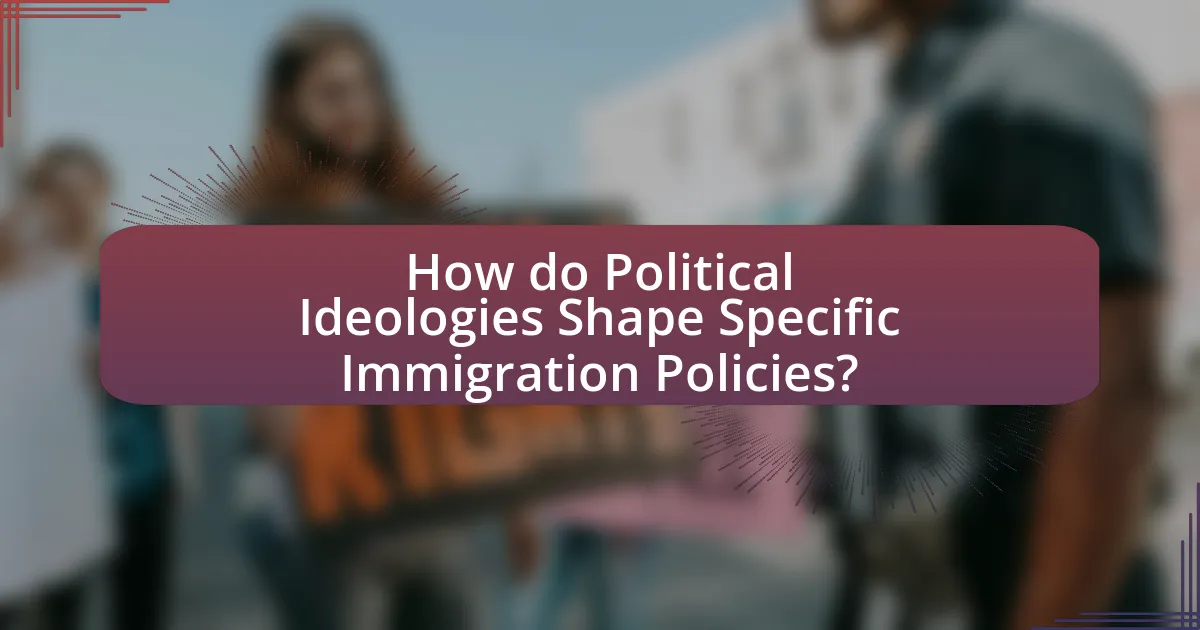
How do Political Ideologies Shape Specific Immigration Policies?
Political ideologies significantly shape specific immigration policies by influencing the values and priorities that guide legislative decisions. For instance, conservative ideologies often emphasize national security and economic protectionism, leading to stricter immigration controls and policies aimed at limiting the number of immigrants. In contrast, liberal ideologies typically advocate for humanitarian approaches, promoting policies that support refugee resettlement and pathways to citizenship for undocumented immigrants. Historical examples include the Immigration Act of 1924, which reflected nativist sentiments prevalent among conservatives, and the Deferred Action for Childhood Arrivals (DACA) program, initiated under a liberal administration to protect young immigrants. These ideological frameworks directly impact the formulation and implementation of immigration laws, demonstrating how political beliefs translate into specific policy outcomes.
What are the specific immigration policies influenced by political ideologies?
Specific immigration policies influenced by political ideologies include restrictive measures such as border security enhancements and deportation initiatives, often associated with conservative ideologies, and more inclusive policies like pathways to citizenship and refugee resettlement programs, typically aligned with liberal ideologies. For instance, the Trump administration’s “Zero Tolerance” policy led to family separations at the border, reflecting a hardline conservative stance on immigration. Conversely, the Biden administration has sought to reverse many of these policies, promoting a more humanitarian approach by increasing the cap on refugee admissions and proposing comprehensive immigration reform. These examples illustrate how political ideologies directly shape the formulation and implementation of immigration policies.
How do political ideologies affect border control and enforcement policies?
Political ideologies significantly influence border control and enforcement policies by shaping the priorities and approaches of governments. For instance, conservative ideologies often advocate for stricter border enforcement, emphasizing national security and the need to control immigration to protect jobs and resources. This is evident in policies such as increased funding for border security and the construction of physical barriers, as seen in the United States during the Trump administration, which allocated billions for border wall construction.
In contrast, liberal ideologies typically promote more lenient border policies, focusing on humanitarian concerns and the benefits of immigration for economic growth. This perspective was reflected in the Obama administration’s Deferred Action for Childhood Arrivals (DACA) program, which aimed to protect undocumented immigrants brought to the U.S. as children from deportation.
Research indicates that these ideological differences lead to varying enforcement practices, with conservative-led states often implementing harsher measures, such as increased deportations and local law enforcement collaboration with federal immigration authorities, while liberal-led states may adopt sanctuary policies that limit cooperation with federal immigration enforcement. Thus, political ideologies directly shape the framework and implementation of border control and enforcement policies.
What impact do political ideologies have on refugee and asylum policies?
Political ideologies significantly influence refugee and asylum policies by shaping the values and priorities that guide decision-making. For instance, liberal ideologies typically advocate for more open and humanitarian approaches to asylum, emphasizing human rights and the moral obligation to protect vulnerable populations. In contrast, conservative ideologies often prioritize national security and economic considerations, leading to stricter immigration controls and reduced acceptance of refugees.
Evidence of this impact can be seen in the differing policies of countries governed by leaders with varying ideological beliefs. For example, during the Obama administration, the U.S. adopted a more welcoming stance towards refugees, increasing the annual cap on admissions, while the Trump administration implemented a travel ban and significantly reduced refugee admissions, reflecting a conservative approach focused on security. This illustrates how political ideologies directly translate into tangible policy outcomes regarding refugees and asylum seekers.
How do political ideologies influence the integration of immigrants?
Political ideologies significantly influence the integration of immigrants by shaping policies that either facilitate or hinder their inclusion into society. For instance, liberal ideologies typically advocate for inclusive immigration policies that promote multiculturalism and support social services for immigrants, which can enhance their integration into the workforce and community. In contrast, conservative ideologies often emphasize stricter immigration controls and prioritize national identity, which can lead to policies that restrict access to resources and limit opportunities for immigrants, thereby impeding their integration. Historical examples include the contrasting approaches of the Obama administration, which favored comprehensive immigration reform, and the Trump administration, which implemented policies aimed at reducing immigration levels and increasing deportations, illustrating how political ideologies directly affect the lived experiences of immigrants in terms of integration.
What policies are shaped by political ideologies regarding immigrant rights?
Political ideologies significantly shape policies regarding immigrant rights, influencing the legal status, integration, and protections afforded to immigrants. For instance, liberal ideologies typically advocate for inclusive immigration policies that promote pathways to citizenship, protection of undocumented immigrants, and support for refugee resettlement, as seen in the Deferred Action for Childhood Arrivals (DACA) program initiated in 2012, which protects eligible immigrant youth from deportation. Conversely, conservative ideologies often emphasize stricter immigration controls, prioritizing national security and economic interests, which can lead to policies such as increased border enforcement and limitations on legal immigration, exemplified by the Trump administration’s “zero tolerance” policy that resulted in family separations at the border in 2018. These ideological frameworks directly impact legislative outcomes and public discourse surrounding immigrant rights.
How do political ideologies affect access to social services for immigrants?
Political ideologies significantly influence access to social services for immigrants by shaping policies that either facilitate or restrict their eligibility. For instance, liberal ideologies typically advocate for inclusive social welfare programs, resulting in broader access to services such as healthcare, education, and housing for immigrants. In contrast, conservative ideologies often promote restrictive policies that limit access to these services, emphasizing national sovereignty and prioritizing citizens over non-citizens.
Evidence of this can be seen in the United States, where states governed by liberal administrations have implemented policies that expand access to healthcare for undocumented immigrants, while states with conservative leadership have enacted laws that deny such access. According to a 2020 report by the Migration Policy Institute, states that embraced more progressive political ideologies were more likely to provide public benefits to immigrants, demonstrating a clear correlation between political beliefs and social service accessibility.
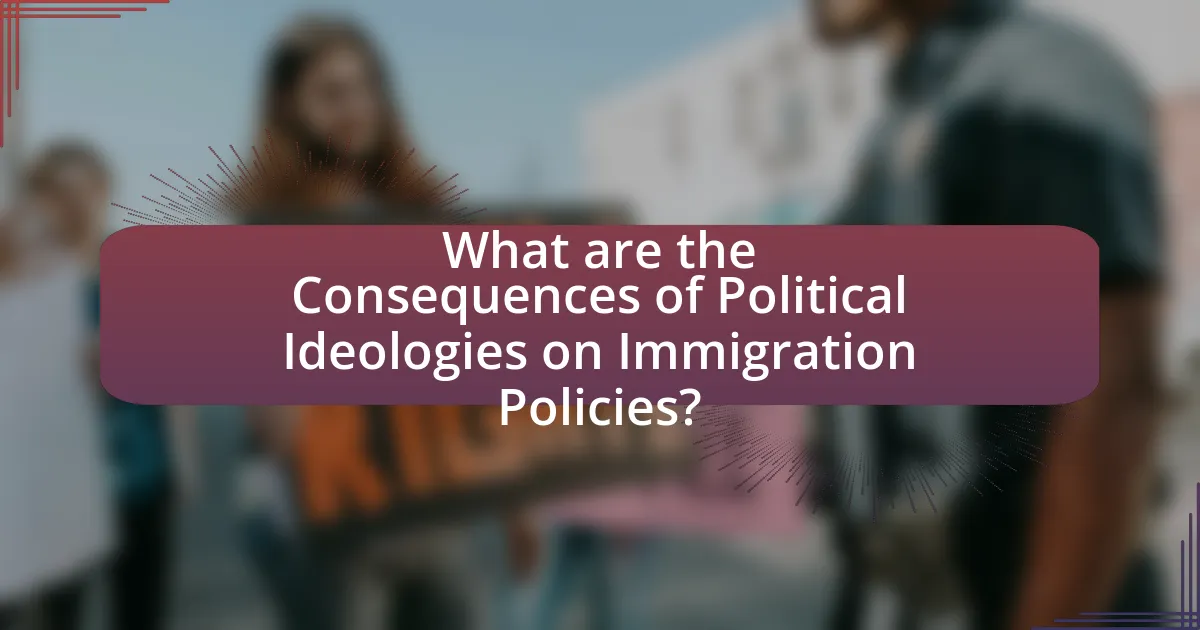
What are the Consequences of Political Ideologies on Immigration Policies?
Political ideologies significantly influence immigration policies by shaping the values and priorities that guide legislative decisions. For instance, conservative ideologies often emphasize national security and economic protectionism, leading to stricter immigration controls and policies aimed at reducing the number of immigrants. In contrast, liberal ideologies typically advocate for more inclusive immigration policies, focusing on humanitarian concerns and the economic contributions of immigrants. Evidence of this can be seen in the contrasting approaches of the Trump administration, which implemented travel bans and reduced refugee admissions, versus the Biden administration, which sought to reverse many of those policies and increase refugee resettlement. These ideological differences manifest in legislation, public discourse, and the overall treatment of immigrants within society.
How do political ideologies impact the effectiveness of immigration policies?
Political ideologies significantly influence the effectiveness of immigration policies by shaping the priorities and frameworks within which these policies are developed and implemented. For instance, conservative ideologies often emphasize border security and strict enforcement measures, which can lead to policies that prioritize deterrence over integration, potentially resulting in higher rates of undocumented immigration and social tension. In contrast, liberal ideologies typically advocate for more inclusive policies that focus on humanitarian considerations and pathways to citizenship, which can enhance social cohesion and economic contributions from immigrants. Research by the Migration Policy Institute indicates that countries with more progressive immigration policies tend to experience better integration outcomes, such as higher employment rates among immigrants and lower instances of social conflict. Thus, the underlying political ideology not only dictates the approach to immigration but also directly impacts the overall effectiveness of the policies enacted.
What are the social implications of immigration policies shaped by different ideologies?
Immigration policies shaped by different ideologies have significant social implications, influencing community cohesion, economic opportunities, and cultural integration. For instance, liberal ideologies often promote inclusive immigration policies that enhance diversity and support multiculturalism, leading to enriched social fabrics and economic growth, as evidenced by studies showing that immigrants contribute positively to GDP and job creation. Conversely, conservative ideologies may advocate for restrictive immigration policies, which can foster social division, xenophobia, and economic disparities, as seen in regions where anti-immigrant sentiments have led to increased social tensions and reduced labor force participation. These ideological frameworks ultimately shape public perceptions and societal attitudes towards immigrants, affecting their integration and acceptance within host communities.
How do political ideologies affect economic outcomes related to immigration?
Political ideologies significantly influence economic outcomes related to immigration by shaping policies that either promote or restrict immigration flows. For instance, liberal ideologies typically advocate for open immigration policies, which can lead to increased labor supply, innovation, and economic growth, as evidenced by studies showing that immigrants contribute positively to GDP and job creation. Conversely, conservative ideologies often support restrictive immigration policies, which can limit labor availability and hinder economic expansion; research indicates that countries with stringent immigration controls may experience slower economic growth due to labor shortages. Thus, the political ideology in power directly impacts the economic implications of immigration through its policy choices.
What challenges arise from the intersection of political ideologies and immigration policies?
The intersection of political ideologies and immigration policies presents challenges such as polarization, inconsistency, and human rights concerns. Polarization occurs as differing ideologies, such as liberalism advocating for open borders and conservatism favoring strict controls, create a divided public discourse. This division can lead to inconsistent policies that fluctuate with changing administrations, undermining long-term immigration strategies. Additionally, ideologies may prioritize national security or economic interests over humanitarian considerations, resulting in policies that neglect the rights and needs of vulnerable populations, as evidenced by the 2018 family separation policy in the United States, which drew widespread condemnation for its impact on immigrant families.
How do conflicting political ideologies create barriers to comprehensive immigration reform?
Conflicting political ideologies create barriers to comprehensive immigration reform by fostering divergent views on the role of government, national identity, and economic implications of immigration. For instance, conservative ideologies often emphasize border security and the prioritization of national sovereignty, leading to resistance against policies perceived as lenient or accommodating to undocumented immigrants. In contrast, liberal ideologies advocate for humanitarian approaches and pathways to citizenship, which can be viewed as undermining law and order by conservative factions. This ideological divide results in legislative gridlock, as seen in the failure of the Comprehensive Immigration Reform Act of 2007, which aimed to address these issues but ultimately collapsed due to partisan disagreements. The inability to reconcile these conflicting perspectives hinders the development of cohesive immigration policies that could address the complexities of the immigration system effectively.
What strategies can be employed to bridge ideological divides in immigration policy discussions?
To bridge ideological divides in immigration policy discussions, fostering dialogue through inclusive forums and bipartisan initiatives is essential. These strategies encourage collaboration among diverse stakeholders, allowing for the exchange of perspectives and the identification of common ground. For instance, research by the Migration Policy Institute indicates that community-based discussions can reduce polarization by highlighting shared values and experiences among differing ideological groups. Additionally, employing data-driven approaches to inform policy debates can help ground discussions in facts rather than emotions, further facilitating understanding and compromise.
What best practices can be adopted for developing inclusive immigration policies?
Best practices for developing inclusive immigration policies include stakeholder engagement, data-driven decision-making, and the incorporation of human rights principles. Engaging diverse stakeholders, such as immigrant communities, advocacy groups, and local governments, ensures that policies reflect the needs and experiences of those affected. Data-driven decision-making, supported by research from organizations like the Migration Policy Institute, highlights the economic and social contributions of immigrants, which can inform more equitable policies. Additionally, incorporating human rights principles, as outlined in international agreements like the Universal Declaration of Human Rights, ensures that policies uphold the dignity and rights of all individuals, fostering a more inclusive approach to immigration.
